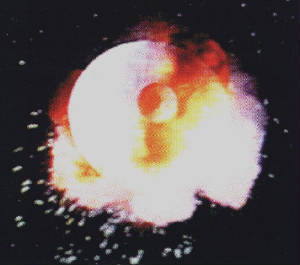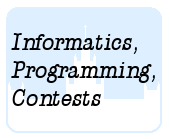Подразделы
Другие разделы
| 1034. Gangs |
| 1035. Smeech |
| 1036. The Dragon of Loowater |
| 1037. Tournament |
| 1038. Wedding |
| 1039. Exchange Rates |
| 1040. Conformity |
| 1041. Pseudoprime numbers |
| 1043. Carpool |
Дата и время
28/02/2026 21:24:17
 1042. Friend or Foe?
1042. Friend or Foe?
 Friend or Foe?
Friend or Foe?
 Геометрия
ГеометрияОлимпиадные задачи на английском языке

| 03/07/2008 | Лето 2008 дорешивание (12I) |
| 28/07/2008 | Лето 2008 - 12 (I) |
| 24/07/2013 | Лето 2013-16 (командная) (I) |
Ограничения: время – 2s/4s, память – 64MiB Ввод: input.txt или стандартный ввод Вывод: output.txt или стандартный вывод 
Послать решение Blockly Посылки Темы Где Обсудить (0)

Luke has a bit of trouble telling the difference between
star systems in the Rebel Alliance and those in the Empire.
He has a list of the `x`, `y`, `z` coordinates of each system in the
Empire and each in the Alliance, but at warp speed he simply
has insufficient time to look up systems in his lists.
After destroying the friendly planet Endor, Luke has had
to admit he needs the help of his targeting computer. His computer,
being an early model, can only compute the truth value
of the inequality
`a*x\ +\ b*y\ +\ c*z\ +\ d\ >\ 0`
Where `x`, `y`, `z` are the coordinates of the system, and `a`, `b`, `c`, `d`
are real-valued coefficients. You are to compute `a`,`b`,`c`,`d`
so that the inequality holds for all systems in the Empire,
and for no systems in the Alliance.
Input consists of several test cases followed by -1 -1.
Each test case first gives the number of Alliance systems,
followed by a line for each system giving the integer
coordinates `-100\ ≤\ x,\ y,\ z\ ≤\ 100` of the
system in 3-dimensional space. The number of Empire systems,
and the coordinates of each, follow. The Empire and Alliance
combined have at least one and no more than 200 systems.
All systems have distinct coordinates.
For each test case, output a single line containing `a,\ b,\ c,\ d` as real numbers separated by spaces. Use enough
precision to ensure that your solution is correct. You may assume that a solution exists; if there
is more than one solution, any one will do.
Sample Input
2 -93 48 -92 -62 12 -32 8 51 98 -61 -3 72 81 95 25 22 89 43 -99 100 -2 -96 -18 45 -63 36 -21 -8 71 -24 42 -1 -1
Output for Sample Input
83.000000 65.000000 -27.000000 -62.000000

 Начало
Начало